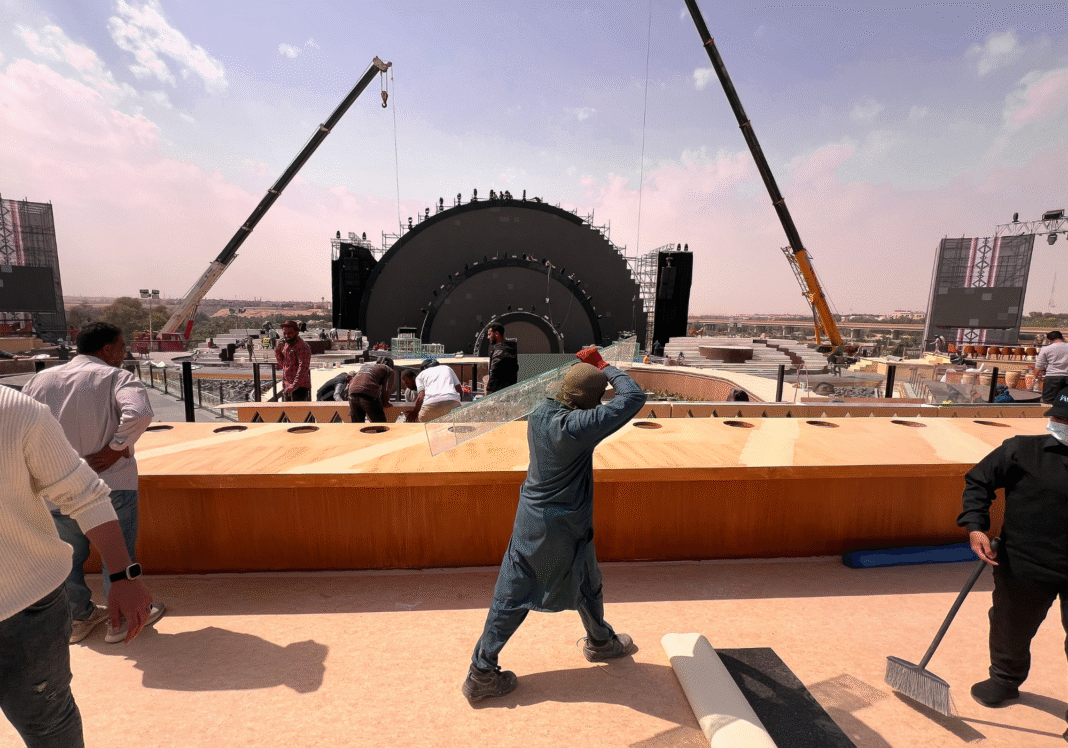Hundreds of migrant workers employed by Sendan International reported unpaid salaries for up to eight months. The workers, including those on Aramco project sites, described severe financial struggles. Moreover, many were left stranded without resources. Consequently, families back home suffered without remittances.
The wage theft comes during Saudi Arabia’s massive construction boom. Additionally, the country is preparing stadiums for the FIFA 2034 World Cup. Aramco, a key FIFA partner, plays a central role in these projects. Therefore, the abuses highlight serious concerns about labor rights in major development initiatives.
Between June and August 2025, Human Rights Watch interviewed 14 workers from Bangladesh, India, and Nepal. Eight confirmed employees on Aramco-linked sites. Moreover, at least 850 workers claimed unpaid wages in media reports. Consequently, the actual figure may be higher.
Reports suggest Sendan International ceased operations in December 2024. However, workers stated they continued until March 2025. Additionally, Sendan did not respond to requests for confirmation. Therefore, Aramco bears responsibility to ensure unpaid workers receive compensation.
Saudi Arabia’s Human Resources Ministry acknowledged the violations. Moreover, it cited wage protection measures and coordination with embassies. Additionally, officials claimed corrective actions were underway. Nevertheless, they provided no details on how many workers received assistance.
Al-Etihad Cooperative Insurance Company began collecting claims under the wage insurance program. However, many workers did not apply out of fear of deportation or losing future employment. Consequently, victims remain uncertain about compensation.
Workers also described dire living conditions. Some received poor-quality food supplies, leaving them hungry and unable to afford basics like toiletries. Moreover, families back home struggled to repay recruitment loans. Therefore, desperation pushed some workers to protest or seek unauthorized jobs.
Protests carried serious risks since Saudi Arabia bans demonstrations. One worker said supervisors pressured them to continue despite unpaid wages. Furthermore, others risked detention by taking irregular work. Consequently, fear shaped most decisions.
Recruitment fees also worsened the crisis. Workers from Bangladesh and India reported paying thousands of dollars before employment. Moreover, supervisors admitted they also faced wage issues. Therefore, mistrust grew between staff and management.
Saudi Arabia’s wage insurance system, introduced in October 2024, only covers workers unpaid for six months or more. Additionally, claims require 80 percent of the workforce to be affected. Consequently, most cases remain excluded.
Even when eligible, compensation is capped at SAR 17,500 and excludes end-of-service benefits. Moreover, payments are often delayed for years. Therefore, protections remain grossly inadequate.
Out of desperation, some workers left without filing claims. Others refused out of fear of losing legal status or future opportunities. Additionally, only a few who applied are still waiting for responses. Consequently, many remain trapped without justice.
Wage theft against migrant workers continues as one of Saudi Arabia’s most widespread abuses. Moreover, the International Labour Organization has received formal complaints against the kingdom. Therefore, global attention grows on labor rights ahead of major events like the World Cup.
Finally, Human Rights Watch stressed that Saudi Arabia must enforce genuine labor protections. Moreover, FIFA and international companies should demand accountability in projects tied to Aramco. Consequently, workers’ rights can only be secured through systemic reform.





